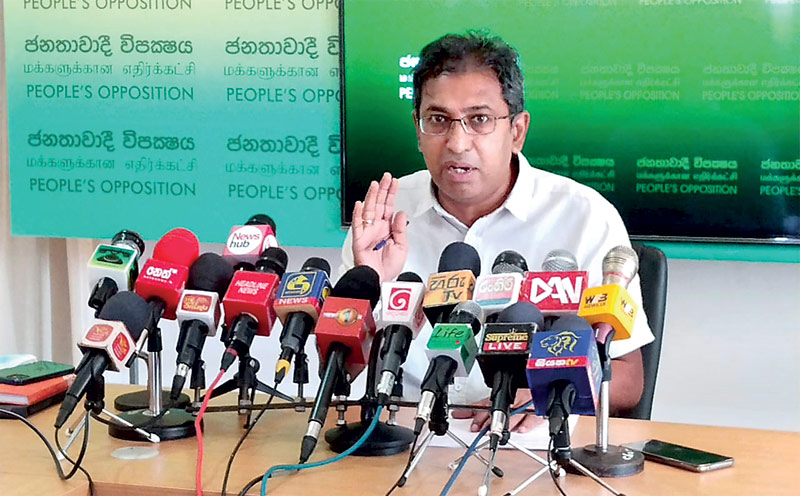Tuesday Feb 24, 2026
Tuesday Feb 24, 2026
Monday, 19 July 2021 03:49 - - {{hitsCtrl.values.hits}}

SJB MP Dr. Harsha de Silva addressing the media yesterday
By Asiri Fernando
Former Economic Reforms Minister and Opposition MP Dr. Harsha de Silva yesterday defended the economic policies of the Yahapalanaya Government and replied to allegations of economic mismanagement.
The Samagi Jana Balawegaya MP accused the present Government of attempting to mislead the public by misinterpreting data. He also blamed the Government for not doing enough to reduce the impact of the economic crisis on the people. Addressing a press conference, Dr. de Silva rejected the allegation that Sri Lanka’s Fitch rating had dropped from stable to negative due to the actions of the Yahapalanaya Government.
“The current Government has made allegations aimed at portraying the previous Government as those responsible for the economic woes we are facing today. This is a smokescreen to hide that the real causes are the current Government’s ill-advised policies. Therefore, I want to answer these allegations,” Dr. de Silva said.
“In 2014, Sri Lanka’s Fitch rating was BB-. In February 2016, Sri Lanka was downgraded once to B+. In subsequent ratings, February 2017 and February 2018 Sri Lanka’s outlook was revised to stable and the ratings were affirmed. In December 2018, during the constitutional coup, Sri Lanka’s rating was downgraded to B. Then when the new Government came to power in December 2019 Sri Lanka was again downgraded to B with a negative outlook. In five months, ending in April 2020, Sri Lanka was once again downgraded to B-. Finally, in November 2020, Sri Lanka was downgraded to CCC, Sri Lanka’s lowest-ever credit rating,” MP de Silva stated.
The Opposition MP dismissed allegations that the trade deficit grew from $ 7.6 billion to $ 9.3 billion during the previous regime as ‘false’, pointing out that the trade deficit in 2014 was $ 8.3 billion and that by 2019, the trade deficit had declined to $ 8 billion. He also blamed the devaluing of the rupee due to the 2018 ‘constitutional coup’ for a decline in GDP.
The former Minister said that allegations of the GDP reducing from 6.8% to 2.3% during the Yahapalanaya Government were false. “The immediate post-war boom was supported by economic activity of two provinces being added to GDP. By 2013, GDP growth had declined to 3.5%. Quarterly GDP growth from Q1 2015 to Q3 2018 averaged 4.3%. The momentum was lost due to the constitutional coup in October 2018, which dragged down Q4 2018 growth to 2.1%,” he explained. However, Dr. de Silva said that in 2019, the Easter Sunday attacks further dampened economic growth.
“By the end of 2014, gross official reserves were $ 8.2 billion of which $ 2.2 billion were short-term swaps. Stable long-term reserves were thus only $ 6 billion as of the end of 2014. By the end of 2019, gross official reserves were $ 7.6 billion of which short term swaps was only $ 360 million. Stable long-term reserves were thus $ 7.2 billion by the end of 2019 – which is superior to the position in 2014,” Dr. de Silva explained, responding to criticism that claimed national reserves had dropped from $ 8.2 billion to $ 7.6 billion during the Yahapalanaya Government’s term of office. He also pointed out that total reserves in 2014 were $ 9.9 billion, whereas, by 2019, the total reserves were $ 10.4 billion.
The SJB MP urged the Government not to mislead the public about the worsening economic crisis and immediately seek international assistance to regain investor and lender confidence by restructuring debt repayment.
“I first spoke about restructuring debt payments in Parliament in November 2020. I asked the Government to reprofile debt, pointing out that this issue will get worse by mid-2021. But like with the COVID-19 vaccine and the Government promoting home remedies, when we raised a red flag, the Government didn’t take it seriously,” Dr. de Silva argued, pointing out the Government’s stubborn approach to policymaking cost them an opportunity to better manage the crisis.
“No matter who is in Government, the brunt of the economic crisis will be felt by the public,” the Opposition MP stressed, adding that robust action based on broad consultation was urgently needed to soften the impact.